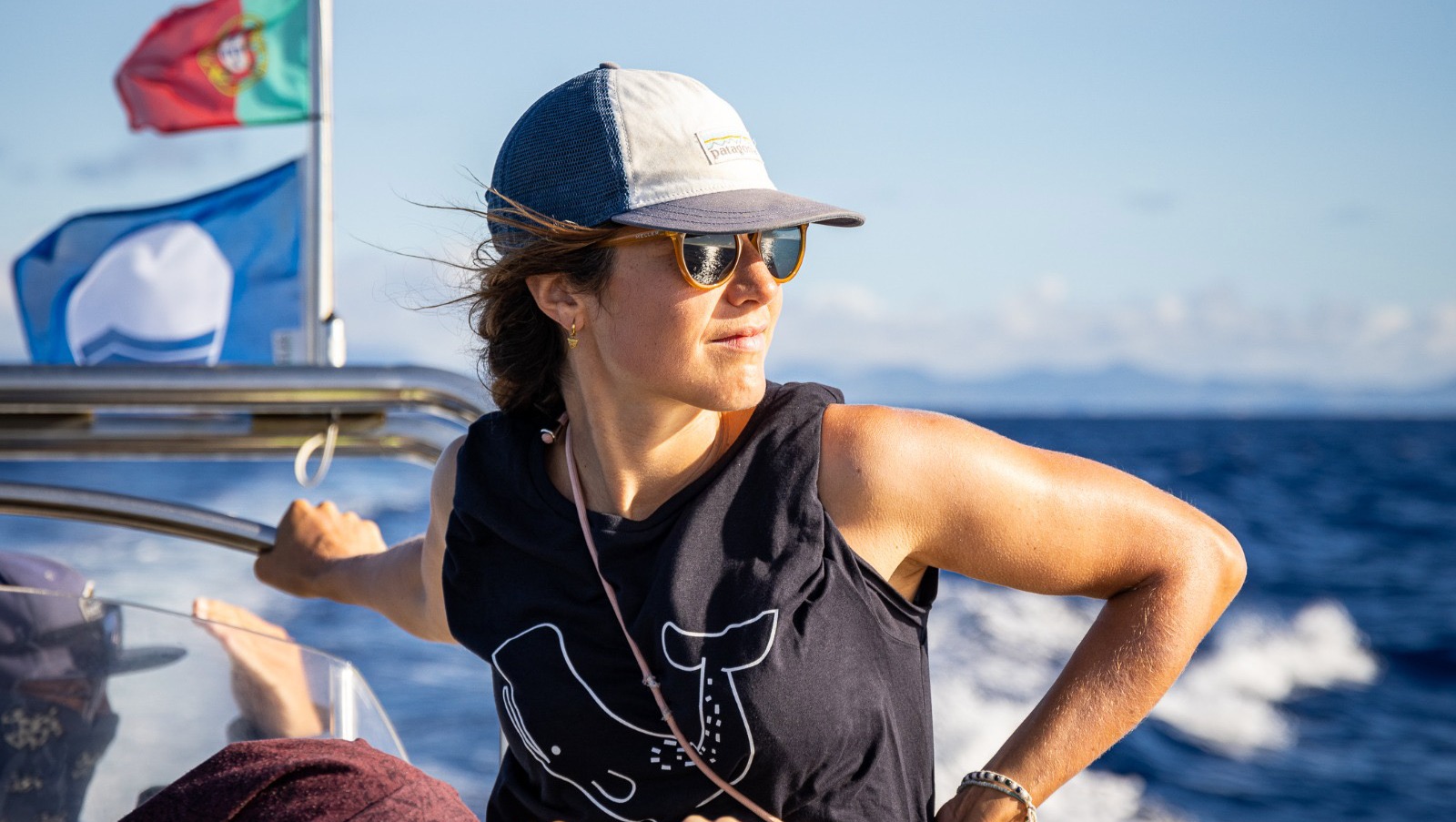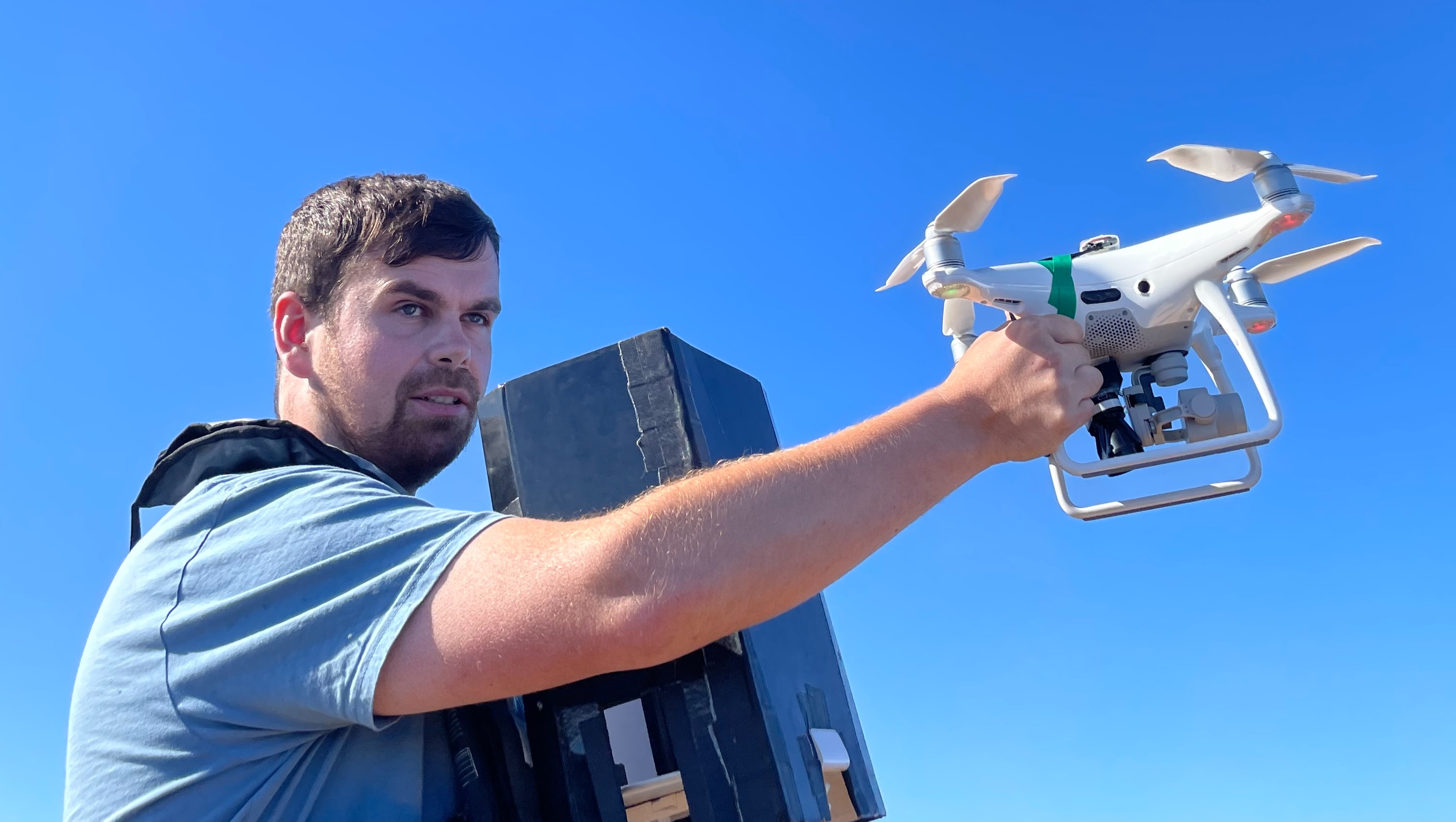
Studying sperm whales in the Azores - 2024 season
Donation protected
Hello, our names are Stéphanie and Seán and we are both PhD candidates, studying sperm whales in the Azores. We use non-invasive and non-intrusive methods to study the diet and the size of sperm whales.
Who are we?
Stéphanie : "I'm Belgian and I live on the island of São Miguel for 5 years, where I study the University of the Azores. I have a background in molecular biology and I’m applying my skills to study cetaceans (whales and dolphins) feeding ecology. More specifically, I'm studying toothed cetaceans (odontocetes) eating cephalopod (squid and octopus), such as sperm whales, Risso’s dolphin and pilot whales."

photo: Francisco Garcia
Seán “I’m Irish and based based at the Atlantic Technological University in Galway, Ireland but I have worked in São Miguel over the past 3 years doing fieldwork in addition to up in the Arctic off Norway I am studying sperm whale size structure and I use a drone to measure the size of whales in the Azores by flying over to make measurement estimates with using a technique called aerial photogrammetry."

We both using a participatory based approach, which mean that we collaborate with local tourism companies (whale watching) in order to go to sea and collect data and samples.
The contribution of the whale watching operators is very valuable. The biologists and skippers onboard include some highly skilled and intelligent marine biologists with keen interest for research. Moreover, clients enjoy having an engaging experience rather than just taking part in a solely touristic activity when valuable samples may be gathered as part of Stéphanie’s work.
However, we also complement our collaboration with whale watching companies with dedicated research trips. Last year, we both collaborated with one another to undertake fieldwork and were able to considerably increase the amount of data and samples we could collect thanks these scientific expeditions. This allowed us to have a larger amount of samples and data that is needed to be able to create robust datasets that we can use to make significant contributions to the knowledge of these iconic species when we publish our results in scientific journals to complete our doctoral projects and to share the scientific outputs we produce.
So Far…
2023 has been the most productive season in term of drone data collection and fecal sample collection. Also, we measured Mr Liable (an iconic male sperm whale showing a strong preference for the Azores) after 1 year of trying and we made the first assessment of sperm whale kinship in the Azores (presented at the European Cetacean Society 35th conference).
Video: Mr Liable, diving off South of São Miguel
We have been collecting data and samples off São Miguel over the past two seasons and this year will mark our final field season.
Why 2024 season is important?
This season will help us to advance the research about the sperm whales of the Azores from our different but complimentary studies. Sperm whales are a complexe species so looking at their diet and size are crucial to monitor the species and their habitats quality now in comparison to the past.
The reason for this season is to capitalise on last years collaborations success and to build up a longer-term dataset to evaluate sperm whale diet preferences and size structure. The season will be much shorter compared to last year as we are both busy in the lab and office processing and writing up our results to date but the opportunity for one last attempt to gather samples and data presented itself this summer and we want to take it.
Seán: "Gathering data this year on the female, and young sperm whales of the Azores again will increase my datasets size to build as comprehensive a picture of this species size structure as possible because it reflects on the quality of their habitat."

Stéphanie: "The samples that I am looking for are mainly fecal matter from sperm whales. Having diet data for sperm whales is crucially important in monitoring this species and its habitats because we can study how changes in their ecosystem (water temperature, food availability etc) can affect the whales and dolphins of the Azores."

Filtering sperm whale's feces for data collection
Why do we need financial support?
Studying sperm whales is a richly rewarding and a real privilege to shed some light on the lives of this iconic but still quite mysterious species. It is however very challenging requiring a lot of logistics, licences and planning to make the most of weather windows while the whales are present to make any field season fruitful.
Having the support on land and at sea to work with these whales makes our projects possible, especially with the huge support given by the whale watching companies of São Miguel over the past number of years but there are financial costs to going out at sea in search of whales during dedicated research trips and also ashore in processing samples in the laboratory to run analysis on them and this is why we would like to ask for your support this season, for as little or as much you would like, there is no pressure from us for you to contribute major funds to us but any amount would be greatly appreciated and forever remembered.
It will actively help us contribute to the knowledge of sperm whales in the Azores!
Seán: "It's been fantastic to work with this iconic species and with some amazing friends and colleagues in both locations but securing funding has been difficult from the start to support this work outside of some small travel grants. Whenever I’m in the field I make the most of the opportunities in front of me to maximise the research output potential, if I have the possibility to gather data again, I’ll take it. Accessing animals to gather data is costly and we need some support to make the most of our final field season in the Azores"
Stéphanie: "Over the years, we have weaved great collaborations that presents us opportunities to go to the sea and this is priceless! However, we need your help to fully enjoy it and take all the advantages of it"
Budget description
Boat's rental for 10 trips (including fuel) : 1800€
+ Transaction fees 3% for GO FUND ME
Licences
This work is performed under the necessary licences.
• LMAS-DRPM/2023/07; LMAS-DRPM/2024/08 from the Direção Regional de Políticas Marítimas
• CCIR-RAA/2023/36 from Direção Regional da Ciência e Tecnologia.
Fieldwork updates
You can follow our projects and our updates from the field through our project’s website and social media accounts
MONICEPH
Sperm Whale Scale

Thank you!
Fundraising team (2)
Stephanie Suciu
Organizer
Ponta Delgada, 42
Seán O'Callaghan
Team member